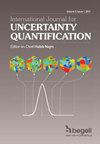EXPLICIT ESTIMATION OF DERIVATIVES FROM DATA AND DIFFERENTIAL EQUATIONS BY GAUSSIAN PROCESS REGRESSION
IF 1.8
4区 工程技术
Q2 ENGINEERING, MULTIDISCIPLINARY
International Journal for Uncertainty Quantification
Pub Date : 2020-04-13
DOI:10.1615/INT.J.UNCERTAINTYQUANTIFICATION.2021034382
引用次数: 12
Abstract
In this work, we employ the Bayesian inference framework to solve the problem of estimating the solution and particularly, its derivatives, which satisfy a known differential equation, from the given noisy and scarce observations of the solution data only. To address the key issue of accuracy and robustness of derivative estimation, we use the Gaussian processes to jointly model the solution, the derivatives, and the differential equation. By regarding the linear differential equation as a linear constraint, a Gaussian process regression with constraint method (GPRC) is developed to improve the accuracy of prediction of derivatives. For nonlinear differential equations, we propose a Picard-iteration-like approximation of linearization around the Gaussian process obtained only from data so that our GPRC can be still iteratively applicable. Besides, a product of experts method is applied to ensure the initial or boundary condition is considered to further enhance the prediction accuracy of the derivatives. We present several numerical results to illustrate the advantages of our new method in comparison to the standard data-driven Gaussian process regression.用高斯过程回归对数据和微分方程的导数进行显式估计
在这项工作中,我们采用贝叶斯推理框架来解决估计解的问题,特别是它的导数,满足一个已知的微分方程,从给定的噪声和稀缺的观测解数据。为了解决导数估计的准确性和鲁棒性的关键问题,我们使用高斯过程来联合建模解、导数和微分方程。将线性微分方程视为线性约束,提出了一种带约束的高斯过程回归方法(GPRC),以提高导数预测的精度。对于非线性微分方程,我们提出了一种仅从数据中获得的高斯过程周围线性化的皮卡德迭代近似,使我们的GPRC仍然可以迭代适用。此外,采用专家积法保证了初始条件或边界条件的考虑,进一步提高了导数的预测精度。我们给出了几个数值结果来说明与标准数据驱动的高斯过程回归相比,我们的新方法的优点。
本文章由计算机程序翻译,如有差异,请以英文原文为准。
求助全文
约1分钟内获得全文
求助全文
来源期刊

International Journal for Uncertainty Quantification
ENGINEERING, MULTIDISCIPLINARY-MATHEMATICS, INTERDISCIPLINARY APPLICATIONS
CiteScore
3.60
自引率
5.90%
发文量
28
期刊介绍:
The International Journal for Uncertainty Quantification disseminates information of permanent interest in the areas of analysis, modeling, design and control of complex systems in the presence of uncertainty. The journal seeks to emphasize methods that cross stochastic analysis, statistical modeling and scientific computing. Systems of interest are governed by differential equations possibly with multiscale features. Topics of particular interest include representation of uncertainty, propagation of uncertainty across scales, resolving the curse of dimensionality, long-time integration for stochastic PDEs, data-driven approaches for constructing stochastic models, validation, verification and uncertainty quantification for predictive computational science, and visualization of uncertainty in high-dimensional spaces. Bayesian computation and machine learning techniques are also of interest for example in the context of stochastic multiscale systems, for model selection/classification, and decision making. Reports addressing the dynamic coupling of modern experiments and modeling approaches towards predictive science are particularly encouraged. Applications of uncertainty quantification in all areas of physical and biological sciences are appropriate.
 求助内容:
求助内容: 应助结果提醒方式:
应助结果提醒方式:


